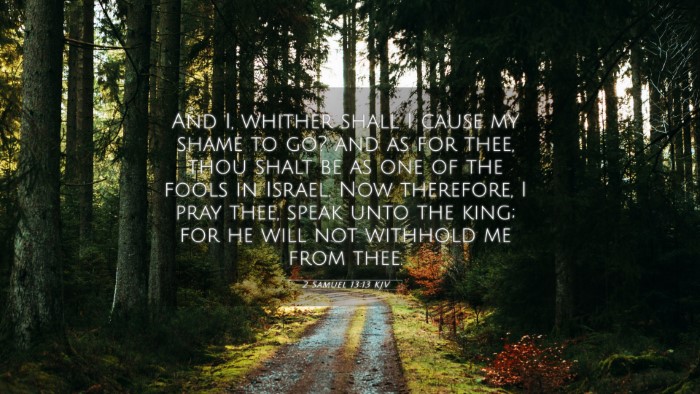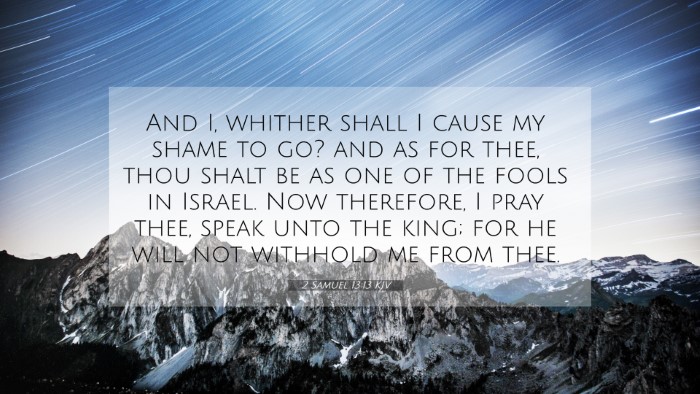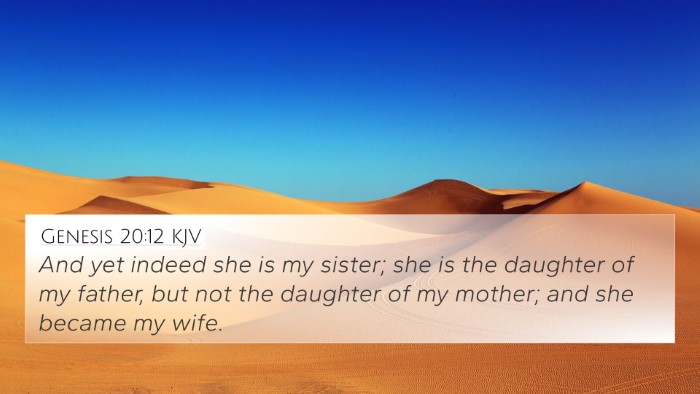Understanding 2 Samuel 13:13
Bible Verse: "And I, whither shall I cause my shame to go? And as for thee, thou shalt be as one of the fools in Israel. Now therefore I pray thee, speak unto the king; for he will not withhold me from thee." (2 Samuel 13:13, KJV)
Summary and Interpretation
This verse is a part of the tragic narrative involving Amnon and Tamar, highlighting the themes of lust, shame, and betrayal. The character of Tamar voices her profound despair and the potential repercussions of Amnon's actions, expertly illustrating the gravity of her situation.
Contextual Analysis
Matthew Henry's Commentary emphasizes that Tamar's words reflect her deep sense of honor and the societal implications of shame. Her plea underscores the enormity of her predicament as she tries to appeal to Amnon’s responsibility.
Albert Barnes' Notes elaborates further that Tamar recognizes the weight of Amnon's actions and the irreparable damage it would cause not only to her but to his reputation as well. He portrays her as a figure caught in a web beyond her control.
Adam Clarke’s Commentary highlights the cultural context, emphasizing how women of that era were often seen as pawns in the strategic plays of familial honor, illustrating the depth of her desperation and the societal pressures involved.
Thematic Insights
- The theme of shame runs deeply within this passage, affecting both characters profoundly.
- Authority and Power Dynamics: Tamar's reference to the king illustrates the hierarchy and often brutal enforcement of honor within the familial structure.
- Despair and Desperation: Tamar’s emotional turmoil is palpable, reflecting not only her personal plight but also the broader implications for her family’s reputation.
Cross-References and Connections
This verse can be understood better through several biblical cross-references:
- Genesis 34:1-2 - The story of Dinah and Shechem reflects on similar themes of violation and its consequences.
- Deuteronomy 22:25-27 - Discusses the law concerning rape and the societal implications that follow.
- 2 Samuel 13:14 - Follows directly after this verse and continues the narrative of Amnon's actions and Tamar’s response.
- Psalm 51:3 - Reflects on repentance and recognizes the weight of shame following sin, similar to Tamar's situation.
- Proverbs 6:32 - Warns against the folly of sexual immorality, which resonates with Amnon's character.
- Lamentations 1:8 - Speaks to the shame of Jerusalem, drawing parallels to Tamar's own shame and despair.
- Ezekiel 18:30 - Calls for repentance from all wrongs, similar to the understanding of the need for accountability in Amnon’s actions.
Connections Between Bible Verses
By examining these cross-rereferences, one identifies the inter-Biblical dialogue across narratives that explore themes of shame, honor, and accountability. The connections between these verses reveal a deeper theological understanding of sin and its repercussions in the lives of biblical characters.
Tools for Bible Cross-Referencing
Utilizing tools such as a Bible concordance or a comprehensive Bible cross-reference guide can help in locating these relationships further. Engaging in cross-reference Bible study enables a richer exploration of scripture, allowing for robust discussions and enlightening insights on the themes addressed in these texts.
Practical Application
Understanding these themes is paramount for anyone looking to apply biblical teachings to modern life. The Bible cross-reference system not only aids in personal study but can inform sermon preparation, enhance teaching perspectives, and encourage deeper theological conversations.
Conclusion
2 Samuel 13:13 serves as a poignant reminder of the complexities of human desire, the weight of societal pressures, and the enduring consequences of actions. By drawing upon cross-referenced scriptures, readers can glean profound lessons and enhance their understanding of the interconnectedness of biblical narratives.





